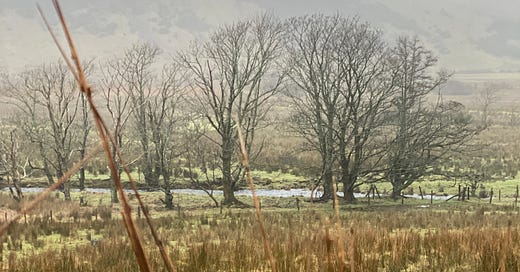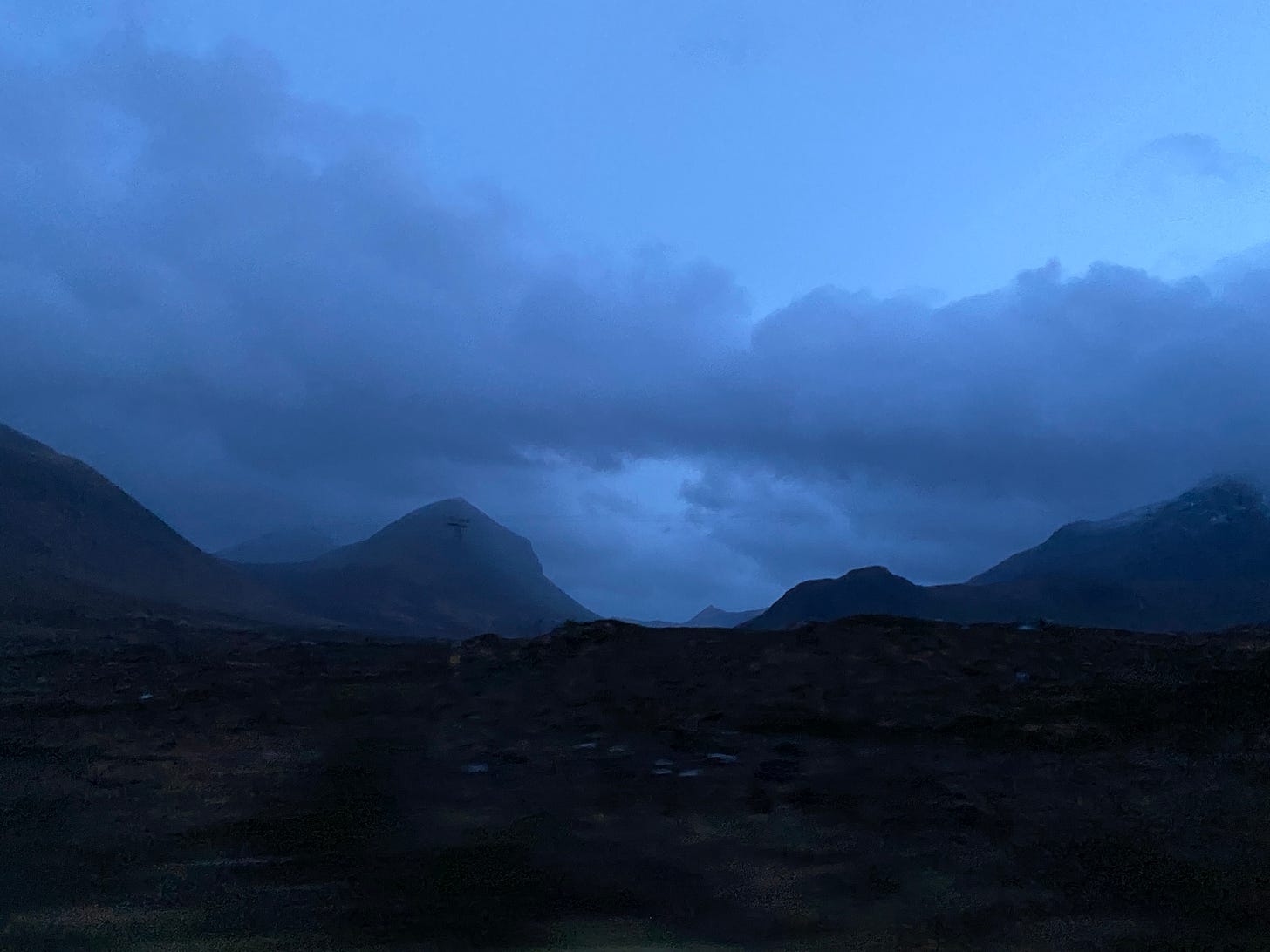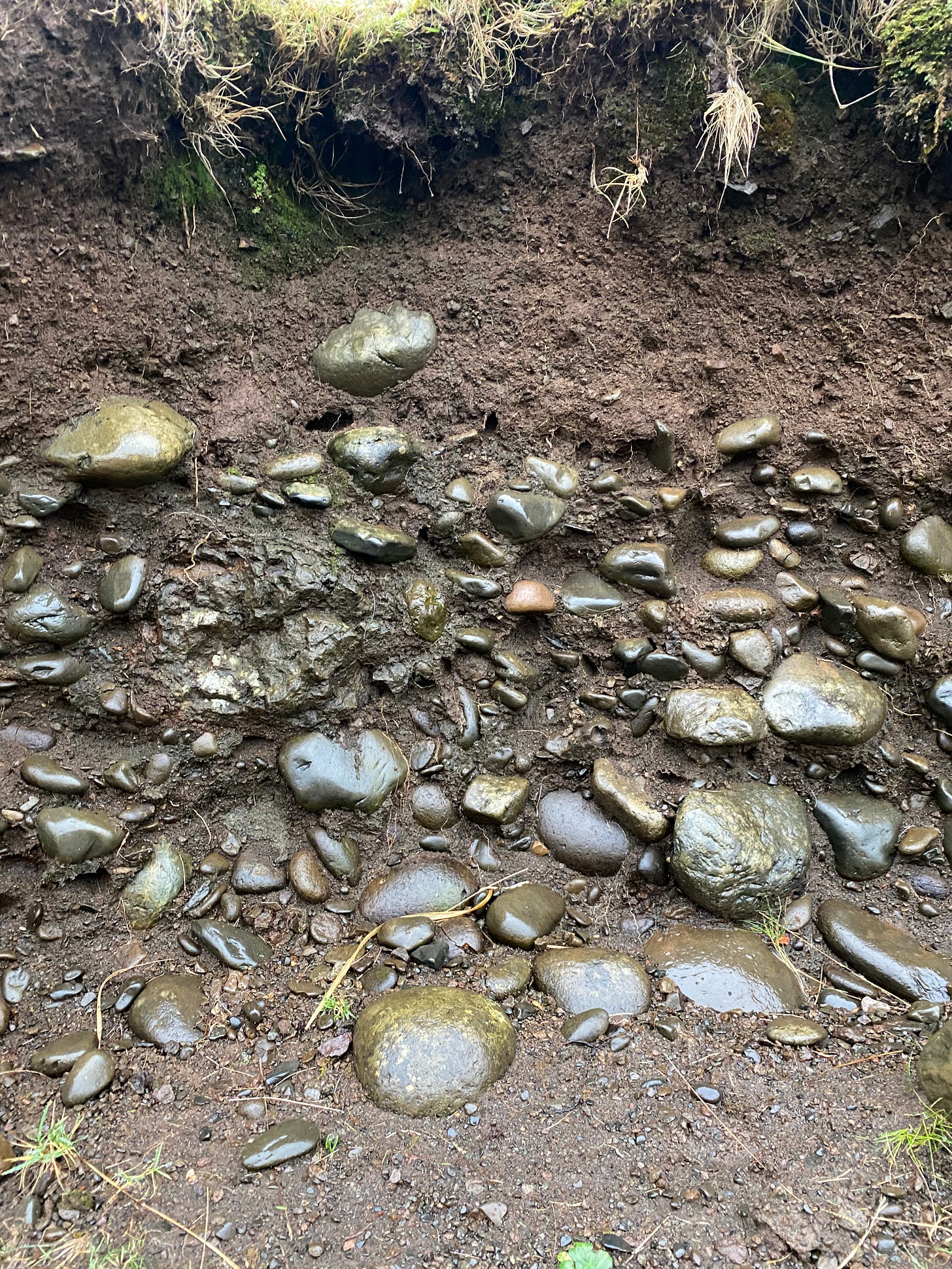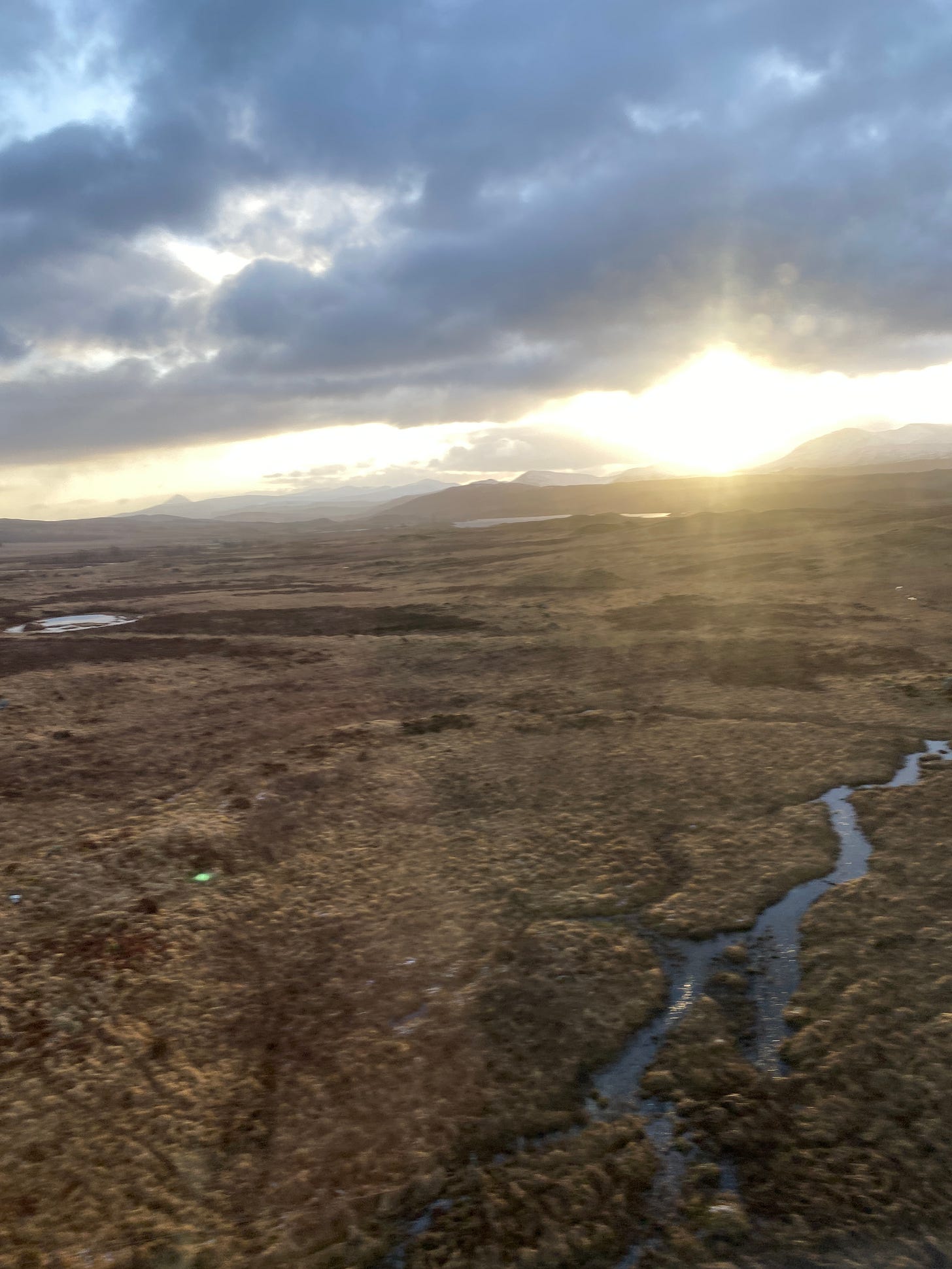My friend Martin is a woodsman. Last year he felled lots of western hemlock, unsuited to the wood in Devon where it was planted a few decades ago. Now, misshapen trunk by slightly rotten trunk, some of these failed trees are being laid carefully into peaty land on Dartmoor, damming drainage ditches dug by ‘improvers’, so that the land may once again hold its full quota of life-giving water. The sight of heaths and moorlands burning here in England last summer was an awful one, these landscapes famous for their wetness underfoot hosting multitudes of water-loving plant species, insects, amphibia and birds, had been drained, compacted and dried out. At last they were set ablaze, mostly by accident but sometimes by arson. The plan is that these transported, transplanted, now supine trees will make good guardians of soils and rainwater as they slowly return to earth.
Audio version
After several dreams of bogs and moors, and much time spent travelling across them by train last week, it is time to write of roots, not the impressive ones of trees this time, but of the yarn-like, soil-seeking threads of moorland plant life. And how, even if we too are not native to where we find ourselves, and perhaps if we feel we have been felled, how we can even in our rest enrich and hold together the fabric of our locale, and allow it to better endure the floods or fires to come.
Stoicism of be-longing
Readers of Uncivil Savant will know I hold that any path worth its salt must be embodied, that fine thoughts and rousing words are no match for an afternoon spent listening quietly to the land. It was recently World Wetlands Day and I took a while researching the vastly overlooked qualities of these oft-maligned, drained and ‘reclaimed’ places, (fens, bogs, marshes, deltas, swamps…) Only to stumble out of the toad-hole an hour later, realising they stored more atmospheric carbon than forests, were teeming homes to even more life than I could imagine. Here in Britain we canalised all of our wild rivers to some extent, drained our fens, straightened our streams, denuded our valley floors of native willow trees, covered the valley sides with crop conifers, built on our floodplains… and then wonder why we have catastrophic floods each winter.
‘The sage does nothing, but nothing remains undone,’ the Tao Te Ching says, asking us to tether our attention to something that is easy for the modern mind to slip off – very good results achieved by understated action, and an absence of struggle. For me the hi-tech fixes currently exhorted by technologists and many environmentalists alike are more of the same compulsive action / reaction / action that created our current predicament. Seeing everything on earth as complicated systems does not mean that they are such, it just means that we are missing a huge part of the living context of natural complexity. This thinking might re-animate a corpse and create a monster, but vats, pods, and electric shocks will not heal our ailing Grandmother. It is a Frankenstein ecology the of the well-fed few, with labs and patents pending1, who would throw every last one of us off the soil, which will be sequestered from those of us who would walk or work with it without a permit.
What would it mean to apply wu wei principles such as uncontrived action, acting without a forceful mind, only doing what is necessary, (even not doing anything if that would yield a better result), in relation not just to the state of our planet, but also with people and so-called things? I feel there is a mirror in the moor. Non-doing is as undervalued as the world’s naturally waterlogged lands. It seems like there is nothing to see, no peak, no city, no big game. Similarly, when we refrain from action, or do just what is necessary and no more, there is little drama, no Instagramable moment, no hero’s journey to recount.
To be complete, a practice or Way must have an element of non-doing, as well as an apparent form. The traditional fasts of all major religions are wise manifestations of non-doing. You don’t have to ‘do’ a fast, you just abstain from eating and the fast is accomplished. In much meditation, one does not ‘do’ anything much, the effort is in returning the mind and body to relaxed open emptiness from its habitual state of over-use (or torpor). Once settled, the mind is not held tightly, instead, a non-reactive, steadfast quality arises. We become like bogs: absorptive, unclear, not immediately useful, slower, fuller, moderating the flows of thought and life, like peat. We make ourselves less prone to flooding, and save others the ill effects, we abide with the weather, internal or external. We are not dredged and straightened, fast flowing and full of vessels plying cargo, we are difficult to navigate, we must be crossed with care, perhaps by currach.
Both
and have recently written movingly about a certain kind of Stoicism needed now and in the coming times. I agree, but I would like to add a little about the unintended effects, for once of the good kind, of an old-fashioned steadfastness and conviviality. This may take a couple of weeks’ posts, and I want to look at each quality first from non-doing, and then from doing. None of what I am going to suggest is new and it is probably highly unfashionable, but I am happy to be in good company.2As moss is
Nothing on earth, nothing in the universe as yet observed, is unconnected, solitary and acting alone. Sometimes we read the ancients and we hear a singular voice, named or un-named, and ascribe to it a lone wisdom. But even a cursory look at history’s scribal traditions and the simultaneous up-welling nature of knowledge shows us a web where sometimes we had assumed a single line. When we cut ourselves off in our occasional mountain top vantage point, while we may be blessed with a very grand vista for a moment, we are prone to a fundamental error in view. The view of / from aloneness is illusory: to have been born is already to be embedded in the mossy-mat-like continuum of creation, more particularly, the cascading generations of humans, our family, and all our ancestors. That is a fact of life we all have in common.
Remembering this, suddenly humour bubbles up, like a big gassy, grassy, fart from the heaving bog. A wiser, more connected heart-mind says: ‘So, you doing ok there, lone ranger? You weren’t made on a slab from bits, your brain’s not a chip, and your heart isn’t in a box, dear.’ And stepping carefully along the peaty paths, we look down and realise the ancient marsh that spreads beneath us is stacked over centuries by thousands of millions of tiny little plant roots, all woven and growing together, matting, spreading, supporting, feeding each other, seeming to be separate only if peered at through a lens. Then with an upward flick of the chin, our gaze recognises the unbroken unity of it all. At last we sigh, and having adjusted our view, spot our friend half a mile off, paddling over with our dropped oar and the last of the beer.
Humour, connexion
I would say: ‘If you are reading this you are not alone,’ is the subtext of all writing.
Which makes me laugh out loud. Just think, Descartes and the dualists, [I never rated their debut album], the ‘it’s a simulation’ crew, the cryo-bio boiz, in fact the whole mopey, screechy lot of the ’nothing means anything, it’s all inert matter!’ posse, all, with every syllable they utter and each text they type strengthen the web they seek to prove does not exist. For sure, there are much better uses of language than the flatpack platitudes of un-animists, but The Machine has been schooling them since it turned our cultures over and emptied all the pots where the real knowledge was stored.
But it wasn’t lost. It flowed down the drains, and into the marshes, or through the sewers and lodged in the deltas. And yes, it’s mixed with shit, sometimes. But then, ‘The Tao resides in the lowest places, like water, the places people despise.’ So let’s look here in the mud and root balls, the matted tangle of it all and see what good comes of staying with this.
Our ancestors are upstream, our descendants are downstream, and we are here in the bog with the other beings just now. The Machine wishes us to be more efficient, to canalise us, to dredge and dig us, to make us run clear and fast, spread all our knowledge, disseminate our experiences equally and instantaneously, with no effort, no risk and no limit. What could be nobler! So we straighten ourselves, amputate our oxbows, uproot our osiers and drain our plump clumps of soft rushes. Sometimes a dredger hollows us by telling us we are alone, other times it’s the sharp turf-cutting spade of ‘You are so special’. We look so neat, stacked up ready to burn. They put cleats on our tow paths and tie the coal boats to us. We acquire locks and weirs. The salmon fail to leap the overfall and die without fulfilling their / our destiny, which is to be the holy place where more life, more life, more life is.
Radical / radial
It's time to practice goodwill now while it’s still easy, or at least possible. By which I mean, let’s stop cutting channels in ourselves, our communities and our countries, because it’s how all the nutrients we’ve accumulated (over centuries or more) are draining out. Before we can do anything, we first need to let go of the compulsion to slice everything into finer and finer segments, delineate all our differences and oppose those only marginally different in view or allegiance. I have been quietly returning to noticing real-life behaviour, without being convinced by labels, whether self-applied or not. It feels possible to come together to work with people I might have judged or shunned years ago, because I assumed they stood for something oppressive or narrow-minded. The last few years have turned many of my assumptions upside down.
I feel what the times call for is radical, radial friendship. Radical3, by reweaving the root-mat from those thousand million tiny roots, our roots. Not by asking us all to be or act the same, but just as the many different plants of the bog do, to help hold things together by allowing closer connection. When the Atlantic storms come, followed by floods, the marsh absorbs and mitigates the deluge, benefitting everyone downstream. ‘Downstream’ also means everyone who will come after us, and everyone currently not as fortunate as us.
Radial, by allowing our goodwill to radiate outward as soon as we have developed and stabilised it in our own friendship group, family, fellowship, locale or organisation. Our clump, if you like. When we have stopped cutting ourselves off from each other, and instead, knitted ourselves back in, (which takes risking trust), we can start to clump together with the other tussocks… (which sounds like it should be some kind of country fair game, like Dorset knob throwing, or wellie wanging, and should at least sometimes be fun, right?)
If we practice deepening our convivial roots into the soil of relationships, we will find we can better absorb nourishment from ‘above’, by which I mean our connection to life, or God, or what I call Tao. If we simultaneously outreach beyond our small self of ‘I’, and accept our unique embedded place in society, land, community, ecology, we can relax, as we don’t have to hold ourselves up alone. That even if frail or dying, we are still part of the fabric of life and not to be rooted-out.
This land-building, root-wrangling is the least glamourous work in the world. We cannot remain solo and stoic only about ‘outside events’, instead applying the same steadiness to the difficulties which appear to have come from someone near to us. As the famous Buddhist teaching story goes, it is easier not to mind when an empty boat bashes into us, as we row across a lake, than when there’s someone rowing it. But are they really so different?
An acquaintance posts online, ‘The earth isn’t dying, it’s being killed, and the killers have names and addresses.’ And part of me says, ‘Yes, someone must be held accountable.’ But another part says, ‘We are all responsible.’ And yet another part says, ‘This won’t help with the predicament,’ and gets back to work cleaning the mouse droppings out of the food cupboards.
Horizons
My Grandmaster used to talk about the four-legged creatures who have their hearts facing the good earth, so they are always in connection with that source. The horizon is sometimes glimpsed, but like time, it is not central to their experience. We, on the other hand, have our hearts and eyes looking out towards the horizon, and time presses on us from every direction. We think we see things like ‘progress’ because we experience walking towards things and away from people. Our hearts are rarely connected to earth, to place, and the sense of home that we long for. In our T’ai Chi, and in what Dr Kells would go on to develop as Heartwork, are physical and energetic practices to help us reconnect on the Heaven / Earth vertical axis, as well as to the horizons that radiate in all directions. They situate us in a living cosmos, and over time, explode the false view of separable identity.
As a chronically self-centred and preoccupied young woman, the idea that I would one day feel grounded, (as Charlotte DuCann puts it so well, ‘on-planet’), and simultaneously connected to other people and living entities on a heart level, seemed as unlikely as having a number one single in the charts. Getting on-planet did not happen quickly or smoothly, and it was easier to be in deep connection with landforms and trees quite a while before those pesky humans…
What consolidated it was threefold. Firstly, there were the events in Scotland of which I wrote a few weeks ago. Secondly, there was the ripening of years of T’ai Chi and Heartwork, which had worn away at my sharp edges and softened me. Thirdly, following one life catastrophe after another, I accepted I was part of the mess, the marsh, the mat, and that wasn’t a failure of effort, after all, but a gift.
Next week I will write more on this, including Godsiblingry, land-joy, and the small matter of heaven on earth. Until then, I wish you a very good week.
All this week’s photos are from February’s trip to The Highlands of Scotland and The Isle of Skye. My paid subscribers will receive this month’s chi kung instructional video later today. Thanks so much for your ongoing support, it allows me to write.
This week’s good thing: Writing about bogs this week put me in mind of a piece by one of my favourite writers, Exquisite Corpse by Micheál Mac Gearailt. It’s a tremendous story from the current issue of Dark Mountain, which weaves sensuality, ancient language and dystopian present in a tale of activism against the Irish forestry industry. With striking images by William Bock, a fellow member of the Wilderness Art Collective.
For more background I recommend listening to this episode of The Great Humbling.
Click for yet another excellent recent essay from
and the last paragraph's enheartening quote from Ivan Illich.From radix - Latin, ‘root’.










Thanks Caroline. There is much to absorb in your damp wonderings. In my youth, I was a West Coast boy. Happiest at the top of another mountain gazing out across the ocean at the far horizon with its promise of fresh lands to conquer. It is only in recent years that I have taken time to get to know the eastern parts of this island. A friend has access to a simple wooden shack in the middle of the Norfolk Broads and invited my wife and I to stay there. At first I was disorientated by the flatness. Without the reassuring presence of the friendly mountains, I felt vulnerable and exposed. And it was so boring - all this level sameness.
As usual, it took a few gentle nudges from my wife to make me see the beauty that she saw from the outset. She showed me that all I needed to do was to adjust my focus, shift my frame of reference. Bring my gaze closer. Open my ears. Stop prioritising the visual and use all my senses. It has been a beautiful voyage of discovery into a new world and new ways of sensing the world. Your writing reminds me of that feeling. Thanks again.
What a nourishing read, Caroline. Soggy through and through and so nutrient-rich! It comes at a synchronistic moment, of course, just as I come in from the squelchy land where I live (dry as a bone and hard as rock in summer...), where I was engaged in the long-haul annual tidy-up after coppicing work and mulling over an invitation I want to make to a woman I have only met once, about learning from her to make gözleme with produce from our local farmers to feed members of the local community when they come together to make carnival in an old abandoned citadel in the nearest town... It's all about roots, and radical and radial relationship... I think I'm in love!!!